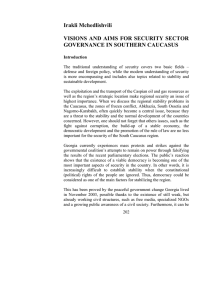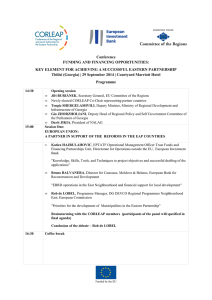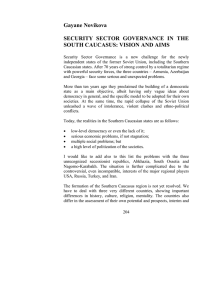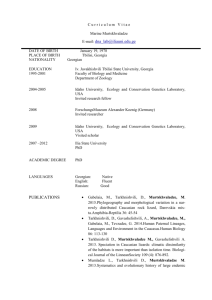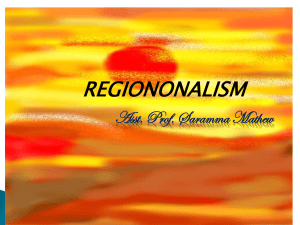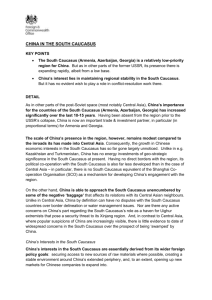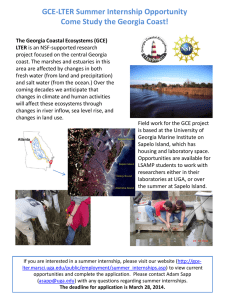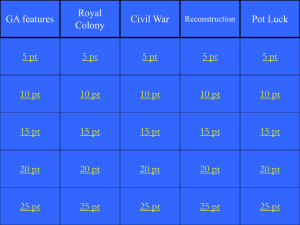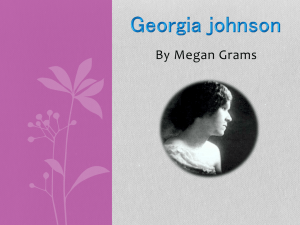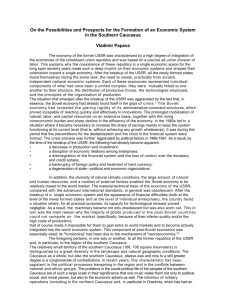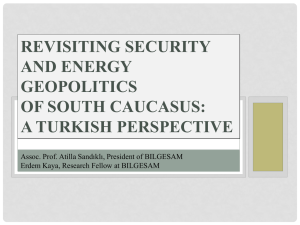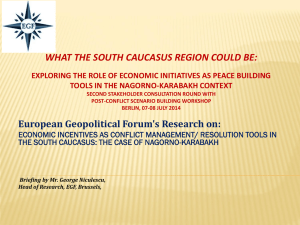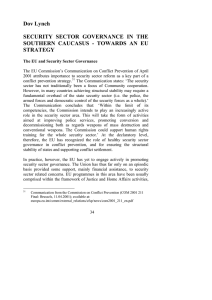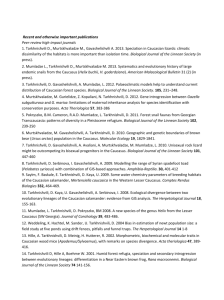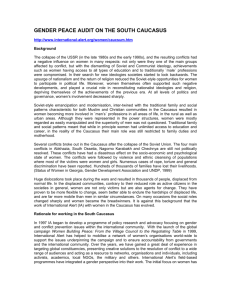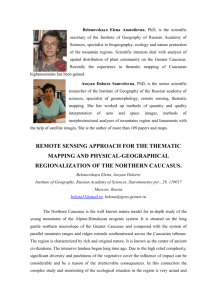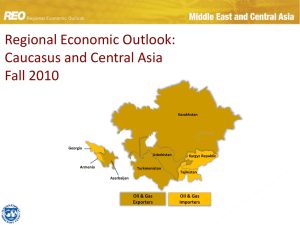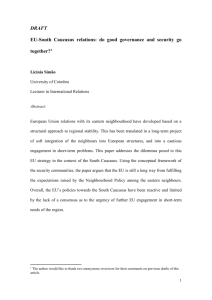Why the European Union`s Model of Integration is Not a Perfect
advertisement
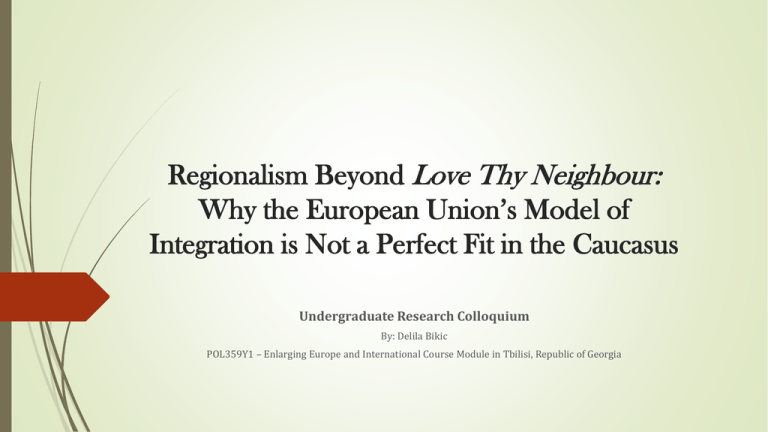
Regionalism Beyond Love Thy Neighbour: Why the European Union’s Model of Integration is Not a Perfect Fit in the Caucasus Undergraduate Research Colloquium By: Delila Bikic POL359Y1 – Enlarging Europe and International Course Module in Tbilisi, Republic of Georgia Introduction: Why this project? Learning Beyond the Classroom Pre-Departure: POL359Y – Enlarging Europe Class, taught by Professor Robert Austin Research Trip to Tbilisi, Republic of Georgia (International Course Module Program 2014) Final Paper combined academic sources and field research Source: BBC News Introduction: Why this project? Research Interests, Motives, and Objectives Academic Focus Interest in European Enlargement and European Union (EU) Politics Interest in the Caucasus region Lead to the study of the European Union’s involvement in the postSoviet space vis-à-vis Republic of Georgia Research and Travel Experience Beyond the textbook: application and implication of theoretical policy frameworks Field research as a unique undergraduate experience Holistic approach to education: discovering Georgian culture and heritage Overview Research questions and initial expectations Discussing Methodology Background of study Consulting secondary works and theoretical foundations Field research (interviews with key stakeholders in Tbilisi) Findings a need for reflection and revision of predictions Final conclusions and lessons learned Framing the Research Questions What is telling of the current EU-Georgia relations? What is the EU approach in Georgia? In the wider Caucasus region? Are there efforts to increase Georgia’s prospects of joining the European integration project or is the EU focus on facilitating domestic reform in the country? If the focus is more internal, in what ways is the EU oriented towards building stronger neighbour cooperation among the Caucasus countries? Is it possible for the EU to export and replicate its model of regionalism in the Caucasus? Can it achieve the same level of political cooperation? Republic of Georgia Azerbaijan Armenia Source: New York Times Defining Region and Regionalism Know the characteristics “Geographical contiguity and proximity” (German, 11) Sub-regionalism Model (Manoli) (South) Caucasus within the Black Sea region Shared economic and political factors A shared identity: awareness and consciousness ‘Regionalist Waves’ Theory (Hurrel) EU as a product of the ‘new regionalism’ wave Identity and value driven Record of Regionalism in the Caucasus? Early attempts: post-Soviet states viewed regional based initiatives as viable for national and economic security (i.e. Commonwealth of Independent States (CIS), GUAM Organization, Black Sea Economic Cooperation Project (BSEC)) Diverging outlooks in 2000s: Georgia looks to Europe, Armenia and Azerbaijan towards Russia Factoring in the EU involvement: regionalized foreign policy for its “eastern neighbourhood” (i.e. European Neighbourhood Policy (ENP) and Action Plans, Eastern Partnership initiative) Source: BSEC Web Value of Field Research Diversity of Stakeholders Katevan Vashakidze, President, Eurasia Partnership Foundation Giorgi Vardishvili, National Expert – Political and Media Analyst, Office of the European Union Special Representative Andro Baranovi, Former Head of Georgian Presidential Administration Renata Worbel, Second Secretary, Deputy Head of the Political, Economic, and Press Section, Office of the European Union Delegation to Georgia Tornike Nozadze, Deputy Head of the European Integration Coordination Department, Office of the State Minister of Georgia on European and Euro-Atlantic Integration Tamar Beruchashvili, Deputy Minister, Ministry of Foreign Affairs of Georgia Roman Kakulia, Head of the European Union Assistance Coordination Department, Office of the State Minister of Georgia on European and Euro-Atlantic Integration Findings… Unpacking Regionalism as a Geographical Construct EU approach Part I: geography as a determinant of likelihood and strength of a state’s external relations (Caucasus as a distinct regional unit) However… far from a “united Caucasus” Some bilateral cooperation at civil society level, “unity hard to achieve” at state level States lack self-identification with a “common Caucasian regional identity” (Eurasia Partnership Foundation Survey Report 2009-2013) Map of the South Caucasus states Source: The International Ecotourism Society The Caucasus Way: replace the regional partner (i.e. Georgian relations with the United States) Findings continued… Geography Revisited: Domestic Roots of International Relations EU approach Part II: Georgia to lead by example in the region Domestic reform for the purpose of Georgia’s role in advancing relations of Caucasus states as “European neighbours”; Georgia as a “beacon of European integration” (Beruchashvili, Deputy Foreign Minister) Thinking about linkage vs. leverage (Way and Levitsky) in the post-Soviet space… EU’s linkage and leverage in Georgia, deeper ties through democratization and reform No EU linkage or leverage in Armenia and Azerbaijan, divide proliferated by Russia Findings continued… Struggles over Territories are Struggles over Cooperation Nagorno-Karabakh, South Ossetia, Abkhazia territories: regional as much as internal conflicts Unresolved territorial conflicts are obstacles to normalizing relations and trilateral cooperation (strained Armenia-Azerbaijan relations over NagornoKarabakh) Russia as an important player in the region has strained relations Georgia’s “European Way”: a Reality? Dependent on the future of Russia’s leverage Interest-oriented politics as a barrier to Europeanoriented Tbilisi Map showing regions of South Ossetia and Abkhazia Source: The Wall Street Journal Findings continued… Caucasian Oil is not European Coal and Steel Expectation that energy and oil are catalysts for cooperation has not been realized Shortcomings of EU efforts to bind the Caucasus in collective interests Oil pipelines (Baku-Tbilisi-Ceyhan) have increased potential for cooperation, especially due to reliance of transit countries for transport (i.e. Azerbaijan oil vis-à-vis Georgia) European Coal and Steel Community (ECSC) in the Caucasus? Roman Kakulia, Office of European and Euro-Atlantic Integration: “The ECSC worked because there was political will to cooperate with other players for unification.” Final Thoughts and Lessons Learned Obstacles to replicating EU’s model of regionalism in the Caucasus Regionalism goes beyond geography, identity and a sense of belonging triumph Unresolved territorial conflicts and role of third actors Oil and gas: not a foundation for political integration Need for a change in the EU approach? Develop individual identification with the region first, external ties second Recognize Russia as an important player and engage in dialogue
